
Italian postcard by B.F.F. Edit. (Ballerini & Fratini, Florence), no. 20510. Photo: Venturini.
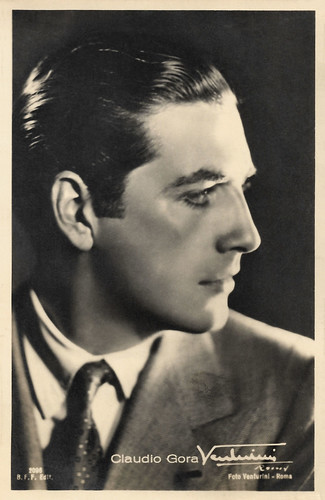
Italian postcard by B.F.F. Edit. (Ballerini & Fratini, Florence), no. 20960. Photo: Venturini.
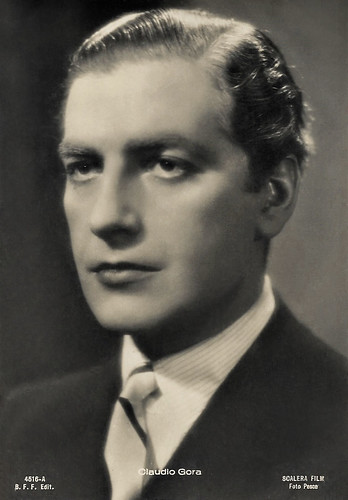
Italian postcard by B.F.F. Edit. (Ballerini & Fratini, Florence), no. 4516-A. Photo: Pesce / Scalera Film.
A courageous investigation of the environment and customs of the new generations
Claudio Gora born Emilio Giordana in Genoa, in 1913. He was the son of the general of the Alpine troops Carlo Felice Giordana (1865-1916).
After graduating in Law, he founded the Teatro Sperimentale Luigi Pirandello in Genoa.
He made his film debut as film actor with Trappola d'amore/Love Trap (Raffaele Matarazzo, 1939). His activity continued with numerous parts as a young actor, including Torna caro ideal/Return Most Beloved (Guido Brignone, 1939), Signorinette/Ladies (Luigi Zampa, 1942) starring Carla Del Poggio, La storia di una capinera/The story of a blackcap (Gennaro Righelli, 1943), Nessuno torna indietro/Nobody goes back (Alessandro Blasetti, 1943, but released in 1945), and Resurrezione/Resurrection (Flavio Calzavara, 1944).
After the war, Gora obtained his first important engagements in Italian-French co-productions such as La Chartreuse de Parme/Charterhouse at Parma (Christian-Jaque, 1947) starring Gérard Philipe, and Marie-Antoinette reine de France/Shadow of the Guillotine (Jean Delannoy, 1956), with Michèle Morgan.
In the meantime, he made his debut as a film director with a demanding job, a film taken from the hit novel by Giuseppe Berto, Il cielo è rosso/The Sky Is Red (Claudio Gora, 1950), starring his wife Marina Berti. It was followed iy Febbre di vivere/Eager to Live (Claudio Gora, 1953), a courageous investigation of the environment and customs of the new generations, based on 'Cronaca', a play by Leopoldo Trieste.

Italian postcard by Alterocca, Terni. Photo: EIA/ Mediterranea Film. Anneliese Uhlig and Claudio Gora in the Italian film Mater dolorosa (Giacomo Gentilomo, 1943).
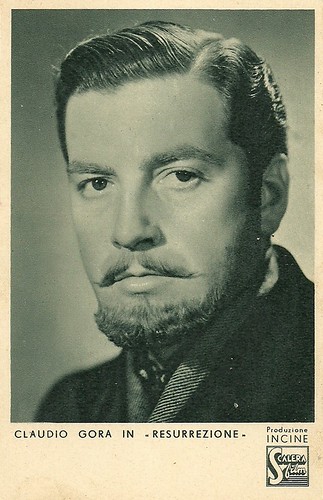
Italian postcard by Zincografica, Firenze. Photo: Produzione Incine / Scalera Film. Claudio Gora in Resurezzione (Flavio Calzavara, 1944), based on Leo Tolstoy's classic novel 'Resurrection' (1899), often adapted to film.

Italian postcard by Zincografica, Firenze. Photo: Produzione Incine / Scalera Film. Claudio Gora and Doris Duranti in Resurezzione (Flavio Calzavara, 1944).
The evil Dr. Mabuse
After a gap between 1952 and 1957, Claudio Gora had a most active film acting career from the late 1950s, doing up to 7 films a year from 1960 to 1961, and often playing magistrates, commissioners, and high-ranked military. In the late 1950s, Gora acted in historical adventure films such as the blockbuster Il tempesta (Alberto Lattuada, 1958) with Silvana Mangano and Van Heflin, based on Alexander Pushkin's 'Captain's Daughter', and Peplum films such as La Venere di Cheronea/Aphrodite, Goddess of Love (Fernando Cerchio, Viktor Tourjansky, 1957) with Jacques Sernas and Belinda Lee.
Gora also played Remo Banducci, husband of the victim (Eleonora Rossi Drago), in Pietro Germi's Un maledetto imbroglio/The Facts of Murder (1959), based on the famous novel by Gadda, 'Quer pasticciaccio brutto de via Merulana'. For this film, he was awarded the Silver Ribbon for supporting actor. Gora acted in I delfini/Silver Spoon Set (Francesco Maselli, 1960), Adua e le compagne/Hungry for Love (Antonio Pietrangeli, 1960), Via Margutta/Run with the Devil (Mario Camerini, 1960), Tutti a casa/Everybody Go Home! (Luigi Comencini, 1960), and Un amore a Roma/Love in Rome (Dino Risi, 1960), all shot in 1960.
In 1960 Gora himself directed Zsa Zsa Gabor in La contessa azzurra/The Blue Countess, a film produced by the shipowner Achille Lauro. With Alberto Sordi, Gora played in Una vita difficile/A difficult life (Dino Risi, 1961). Other important interpretations Gora had in A porte chiuse/Behind Closed Doors (Dino Risi, 1961) with Anita Ekberg, Fantasmi a Roma/Ghosts of Rome (Antonio Pietrangeli, 1961) - one of Belinda Lee's last films before she was killed in a car crash, Il sorpasso/The Easy Life (Dino Risi, 1962) starring Vittorio Gassman and Jean-Louis Trintignant, and Il processo di Verona/The Verona Trial (Carlo Lizzani, 1963).
He also appeared in Il medico della mutua/The Family Doctor (Luigi Zampa, 1968) starring Sordi, Confessione di un commissario di polizia al procuratore della repubblica/Confessions of a Police Captain (Damiano Damiani, 1971), Gente di rispetto/The Masters (Luigi Zampa) and La donna della domenica/The Sunday Woman (Luigi Comencini), the latter both from 1975. Gora also played evil Dr. Mabuse in the German-Italian co-production Die Todesstrahlen des Dr. Mabuse/I raggi di Dr Mabuse/Dr. Mabuse contra Scotland Yard (Hugo Fregonese, Victor De Santis, 1964), while he also was the police chief in Mario Bava's Diabolik!/Danger: Diabolik (1968), starring John Philip Law. Parallel, Gora had also an active TV acting career, from 1960 onward.
Gora's last film acting part was in one of the typical Christmas comedies, Vacanze di Natale '91/Christmas Vacation '91 (Enrico Oldoini, 1991) with Christian De Sica, Ornella Muti, Alberto Sordi, etc. His last TV part was in La piovra 8 - Lo scandalo/The Octopus 8 - The Scandal (Giacomo Battiato, 1997) with Mario Bova. Claudio Gora died one year later, in 1998 (age 84) in Rocca Priora, Lazio, Italy. He acted in 164 films and TV series/plays between 1939 and 1997, while he directed 9 films between 1950 and 1972. Gora was the husband of the actress Marina Berti (1924-2002), whom he met on the set of Storia di una capinera. Gora had five children, all involved in the entertainment world: Andrea, Marina, Carlo, Luca, and Cristina Giordana. Since 2005, the "Claudio Gora Award", an annual competition dedicated to experimental theatre, has been held at the Laboratorium Teatro di Roma.

Italian postcard, no. 88.
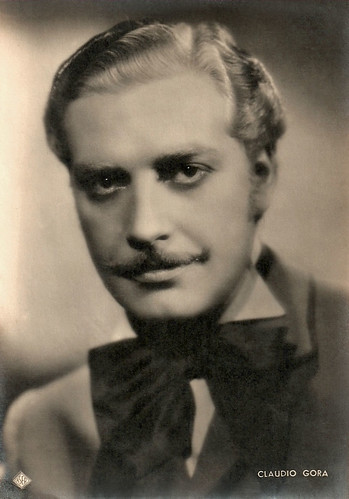
Italian postcard by ASER (A. Scarmiglia Edizioni, Roma), no. 102. Photo: Pesce / SAGFS. Probably for the film Amami, Alfredo! (Carmine Gallone, 1940).
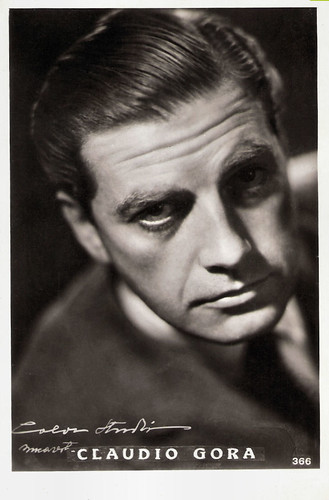
Italian postcard by Stab. Angeli, Terni / A. Terzeli, Roma, no. 366. Photo: Calva Studio.
Sources: IMDb, and Wikipedia (Italian and English).
This post was last updated on 14 June 2024.
No comments:
Post a Comment